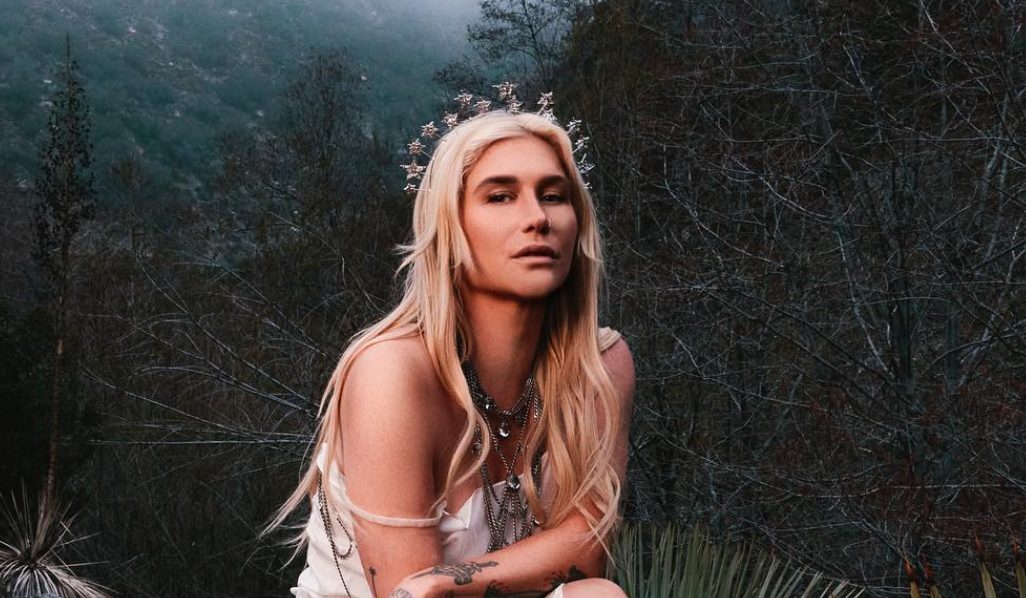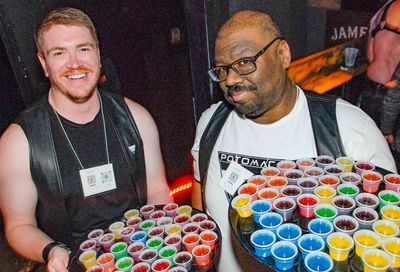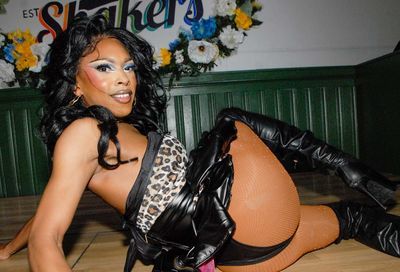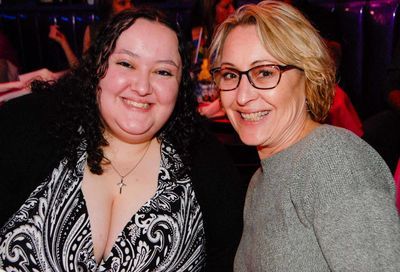Without Fear
Folk songbird SONiA soars with her solo career
“It kicks your butt, touring solo,” says SONiA as she settles into the start of a Saturday afternoon interview from a motel in Ohio, where she’s playing at a women’s music festival.
“We drove till four in the morning last night. And we had an 8:15 wake-up call and got back on the road again. I called you a minute after I threw the guitar on the bed.”
SONiA is no stranger to the touring life. The singer-songwriter started her musical sojourn sixteen years ago as one half of the duo Disappear Fear. After family life became too overwhelming for her partner-in-song — sister Cindy — SONiA went it alone, recently releasing her fourth solo CD, No Bomb is Smart, a ravishing mélange of guitar riffs and melodic hooks, with a sweet yet husky folk-rock sensibility. It’s the first album of SONiA’s that’s fully eligible for a Grammy nomination, and it looks likely to snag a nod in the folk category — a fact that has the artist in an absolute tizzy of delight.
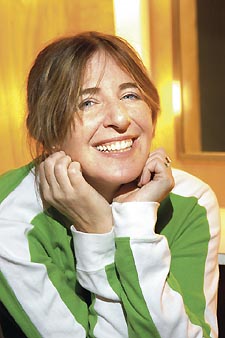 |
Though she won’t divulge her age (“My grandma Reba Zelda said that no young lady should ever tell after they hit twenty”), SONiA expresses herself with a youthful, vibrant zest. All the Pikesville, Maryland native will reveal is that she finally accepted her sexuality when she was 22.
“I was really scared of my feelings and at first I really fought it,” she says of her gay spirit. “I’d be trying to make it work with my boyfriends — who I did love on one level — but I just didn’t take it to the place I went to in my lesbian relationships.
“Love is such a powerful, scary thing,” she continues. “You fall in love and suddenly you’re experiencing all these fireworks by yourself. And it’s not until it’s consummated with the person you’re falling in love with, that it really gets to have life. When that happens, it’s the best, the most vibrant experience you could have.”
Turns out she’s been having that experience for seven years with her partner, Terry Irons, who also serves as her manager. SONiA happily declares she doesn’t know what she’d do without Terry’s business acumen. (It’s Terry who politely yet firmly puts an end to the call when SONiA’s sound check time nears.)
SONiA — whose surname is Rutstein — is on perpetual tour, both throughout the U.S. and internationally. Interestingly, the outspoken pacifist has found her Judaism to be more of a concern in certain countries than her being gay. The land down under, for instance.
“It became an issue about me being an American Jew recently when I was in Australia,” she says. “Some people think it’s wealthy American Jews who keep the United States funding the military process in Israel. And I had to speak to what I feel about the situation: that I don’t want there to be a wall, that I want all of the people who live in Israel to live there peacefully and democratically, not in a state of hell and terrorism. But part of me thinks it will never settle down over there. There’s just too much difference.”
Though most of SONiA’s songs deal with aspects of love, she is not afraid to use her music as a means of putting forth a political viewpoint. On one of the new album’s cuts, “I Am the Enemy,” she even goes so far as to include passages in both Hebrew and Arabic.
“The languages are so close,” she says. “It’s clear to me it’s the same tribe. Anyway, I think it’s just a matter of being able to embrace our brothers. Embrace ourselves and we’ll get there. We’ll get there.”
METRO WEEKLY: Let’s start by talking about your past. How long did you and your sister, Cindy, make music together as Disappear Fear?
SONiA RUTSTEIN: We started Disappear Fear in the late part of 1987. It was October. We put out our first album the following year in October of 1988. We toured first as a duo and then with a band until the birth of her first child, which was in January of 1994. So about six years. But we continued [to record as] Disappear Fear and she continued to tour with me through 1996, so it was really more like nine years. Then I started making CDs by myself.
At first, I continued touring as Disappear Fear with guys in the band. We did that for a couple more years. And then I felt like I was getting far away from what the essence of the music was. When you perform with a lot of people, there’s a lot of logistical management and craziness and stuff — I just kind of wanted to get back to me and my guitar. Which is what I did on my first solo album, Almost Chocolate.
MW: After spending so many years working with your sister, did you find it difficult to strike out on your own?
SONiA: It was enormously difficult — on so many different levels. Cindy was my business partner, so we made all of our business decisions together. She was my right arm, she was there if I screwed up a lyric on stage. She was there to do ten million things. Mostly the way we ran things was that she was the liaison to the outside world — to promoters or agents or whomever — and I basically would be huddled over my guitar being the creative one. I always wrote the songs, but she would come in with the harmonies.
So it was really, really hard — I was losing so much. But we’re very close. She’s my best friend, she knows me better than anybody. And she’s just a great person. Now she lives in Texas with two sons and her husband.
This CD that I just released — No Bomb is Smart — actually kind of brings things full circle. We almost even said it was by Disappear Fear because ten of the twelve tracks have me and Cindy harmonizing. And that harmony is a key part of the Disappear Fear sound. But we didn’t call it by Disappear Fear because she can only join me at a small number of the live shows.
MW: You didn’t want to mislead anyone.
SONiA: Exactly.
MW: Do you sense an appreciable difference between the work you produced as Disappear Fear and the work you create now?
SONiA: I think there’s a maturity in my writing now. Just being a girl on the guitar — there must be ten million of us girls with guitars — your song really has to stand on its own. And your voice has to stand on its own. And your guitar playing has to stand on its own. So it goes a whole lot deeper.
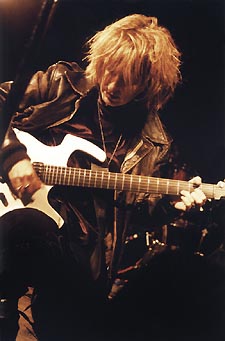 |
MW: Is there any folk artist you’re particularly influenced by?
SONiA: I love Bob Dylan, and I feel enormously influenced by him in the sense that a philosophy of music points to particular issues and social concerns. But he wasn’t truly musically as big an influence on me as his rival, Phil Ochs. I’ve spent hours and hours and hours — if not days — listening to Phil Ochs music. In my heart, Ochs is a much bigger influence. I cover his “No More Songs” on the new album.
MW: Particularly in the sixties, folk music took hold in our society as a form of protest, as a way to carry a message about concerns of the time. What concerns are important to you as a folk artist?
SONiA: Certainly I’m processing things I care about. Sometimes it’s just incredibly selfish — it’s just my broken heart. Or sometimes it’s something that’s really making me angry, like Fox News glorifying how beautiful this or that American tank is.
On the song “No Bomb is Smart,” for example, I’m commenting on the whole premise that technology towards the destruction of human lives is stupid. To call a bomb smart is just silly. No bomb is smart. I’m all about paintball, you know? You want to do that, great. I’m all about flying jets fast — to do sky paintings. Let’s transform the military into something that creates. We build things to destroy ourselves. But we’re one family. It’s crazy. It’s just absurd.
This goes back to the Phil Ochs thing, but Ochs wrote songs from his heart and touched on issues that many singer-songwriters would never, ever, ever go near. [His music] gave me insight. And I made a promise to myself that I would write about what was really important to me. One of the things that was really important to me when I was 14-years-old and kind of figuring out that I was gay was that there weren’t gay songs on the radio. You couldn’t get that kind of thing.
So when I started Disappear Fear [I wanted to address gay issues], and my sister was like, “Just do what’s in your heart. People will either get it or they won’t get it.” It wasn’t necessarily about singing to the queer community, it was just doing what I do — just being loud, trying to make some noise one way or another.
MW: So your primary issue is that of your own sexuality.
SONiA: Yeah, I guess it’s just the same old love is love thing. It’s sort of a double-edged sword. It’s really nothing because it is just love. The other side of it is: “Who are you to tell me who I’m supposed to love?”
MW: Why did you choose music as your forum of expression?
SONiA: It’s just the way I live, like any bird, you know? I’m just that in human form. And I’m glad that I can do it, because I love doing it. But there is reality too — the reality that you have to be able to eat and have a roof over your head. Fortunately, I can make that happen by making music.
MW: Well, you’re probably better paid that most birds. Are you ever surprised by how far your career has come? Nine CDs. The strong possibility of a Grammy nomination for your latest CD. Do you ever reflect on your success?
SONiA: Every now and then I go, “Wow, I really like this, I’m really glad I’m doing this. I can die now” — sort of one of those very deep sighs of accomplishment, but that’s pretty rare. I see my CDs as places I’ve been. And there are so many more or many more countries — or CDs — to go visit.
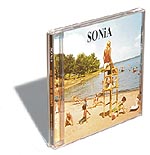 Sonia: No Bomb is Smart |
MW: How do you feel about these new online services, like Apple’s iTunes, that give people the option of buying individual songs rather than an entire album? Some artists I’ve talked to aren’t thrilled with it, claiming it compromises their overall vision for an album.
SONiA: Well, I’m all about it. Music is a personal choice. And people should have exactly what they want, when they want it, at the volume they want it, and as much as they want it.
MW: Other lesbian artists — Melissa Etheridge, k.d. lang and The Indigo Girls, for instance — achieved their superstardom before coming out. You’ve been out since the onset of your career. Do you think it’s even possible to become a musical superstar as a gay artist?
SONiA: [Laughs.] I’ll let you know in a couple of years.
MW: Well, let me ask you this, then: what do you think is the key?
SONiA: Having a label [support you], I think. Having some sort of mechanism behind you that can really pump it out there. And then having the people love you. But it takes a lot of money to get that kind of saturation to get it out there to that magnitude.
A musical career is not like one single door that you walk through. It’s a door here, a door there. The nature of our careers are such that they extend a little bit every day or every minute.
MW: Have you experienced any homophobia in the context of your own career?
SONiA: Oh, yeah. The main reason why I was never signed to a major label was because I was out. Actually, a few years ago RCA was doing a deal with Rounder Records to buy out my contract, but they wanted control of the content. And I wouldn’t be willing to give anybody control of that, ever. I think bombs are stupid. And I’m queer. And I’m Jewish. And I’m from Baltimore. I have all these weirdo things going on. [Laughs.]
MW: The music itself should be asset enough.
SONiA: From your mouth to God’s ears. Or better, a record label CEO’s ears.
MW: One last question: Why the small “i”?
SONiA: It’s how I wrote my name when I first started writing. I wrote Sonia with all capital letters and a small “i” when I was five years old. And I just continued to write it that way. Now I think it looks like a cool logo. And, you know, a small “i” also keeps the ego in check.
SONiA’s No Bomb is Smart (Disappear Records) is available at area record stores and online at Amazon.com.
Support Metro Weekly’s Journalism
These are challenging times for news organizations. And yet it’s crucial we stay active and provide vital resources and information to both our local readers and the world. So won’t you please take a moment and consider supporting Metro Weekly with a membership? For as little as $5 a month, you can help ensure Metro Weekly magazine and MetroWeekly.com remain free, viable resources as we provide the best, most diverse, culturally-resonant LGBTQ coverage in both the D.C. region and around the world. Memberships come with exclusive perks and discounts, your own personal digital delivery of each week’s magazine (and an archive), access to our Member's Lounge when it launches this fall, and exclusive members-only items like Metro Weekly Membership Mugs and Tote Bags! Check out all our membership levels here and please join us today!




